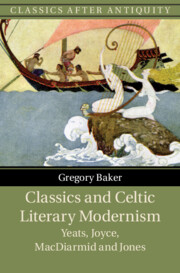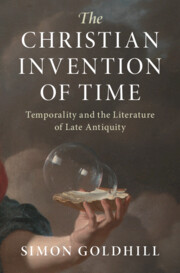Refine search
Actions for selected content:
60720 results in Classical studies (general)
Chapter 13 - Regulation Time
- from Part II
-
- Book:
- The Christian Invention of Time
- Published online:
- 13 January 2022
- Print publication:
- 03 February 2022, pp 314-336
-
- Chapter
- Export citation
Chapter 2 - The Time of Death
- from Part I
-
- Book:
- The Christian Invention of Time
- Published online:
- 13 January 2022
- Print publication:
- 03 February 2022, pp 45-63
-
- Chapter
- Export citation
Chapter 1 - God’s Time
- from Part I
-
- Book:
- The Christian Invention of Time
- Published online:
- 13 January 2022
- Print publication:
- 03 February 2022, pp 19-44
-
- Chapter
- Export citation
Chapter 6 - Making Time Visible
- from Part I
-
- Book:
- The Christian Invention of Time
- Published online:
- 13 January 2022
- Print publication:
- 03 February 2022, pp 113-131
-
- Chapter
- Export citation

Classics and Celtic Literary Modernism
- Yeats, Joyce, MacDiarmid and Jones
-
- Published online:
- 20 January 2022
- Print publication:
- 03 February 2022
-
- Book
-
- You have access
- Open access
- Export citation

The Christian Invention of Time
- Temporality and the Literature of Late Antiquity
-
- Published online:
- 13 January 2022
- Print publication:
- 03 February 2022
A SURVEY OF ROMAN ARCHITECTURE - (F.) Yegül, (D.) Favro Roman Architecture and Urbanism. From the Origins to Late Antiquity. Pp. xvi + 897, ills, maps, colour pls. Cambridge: Cambridge University Press, 2019. Cased, £230, US$240. ISBN: 978-0-521-4707-1.
-
- Journal:
- The Classical Review / Volume 72 / Issue 1 / April 2022
- Published online by Cambridge University Press:
- 12 January 2022, pp. 279-281
- Print publication:
- April 2022
-
- Article
- Export citation
JUSTIN MARTYR'S DIALOGUE WITH TRYPHO - (M.) Den Dulk Between Jews and Heretics. Refiguring Justin Martyr's Dialogue with Trypho. Pp. viii + 174. London and New York: Routledge, 2018. Cased, £120, US$160 (Paper, £36.99, US$48.95). ISBN: 978-0-815-37345-2 (978-0-367-59072-7 pbk).
-
- Journal:
- The Classical Review / Volume 72 / Issue 1 / April 2022
- Published online by Cambridge University Press:
- 11 January 2022, pp. 115-117
- Print publication:
- April 2022
-
- Article
- Export citation
CONCEPTS OF SUN AND EARTH IN THE ANCIENT WORLD: Bilić (T.) The Land of the Solstices. Myth, Geography and Astronomy in Ancient Greece. (BAR International Series 3039.) Pp. xiv + 198, ills. Oxford: BAR Publishing, 2021. Paper, £49. ISBN: 978-1-4073-5862-8 – CORRIGENDUM
-
- Journal:
- The Classical Review / Volume 72 / Issue 1 / April 2022
- Published online by Cambridge University Press:
- 10 January 2022, p. 367
- Print publication:
- April 2022
-
- Article
-
- You have access
- HTML
- Export citation
TWO EXHIBITIONS IN ROME - (S.) Settis, (C.) Gasparri (edd.) I marmi Torlonia. Collezionare capolavori. Pp. 335, b/w & colour ills. Milan: Electa, 2021. Cased, €39. ISBN: 978-88-918-2925-2. - (M.) Codognato, (A.) Coliva (edd.) Damien Hirst: Archaeology Now. Pp. 304, colour ills. Venice: Marsilio Editori, 2021. Cased, US$80. ISBN: 978-88-297-1046-1.
-
- Journal:
- The Classical Review / Volume 72 / Issue 1 / April 2022
- Published online by Cambridge University Press:
- 10 January 2022, pp. 355-358
- Print publication:
- April 2022
-
- Article
- Export citation
VIEWS ON SPARTAN WARRIORS - (M.) Cole The Bronze Lie. Shattering the Myth of Spartan Warrior Supremacy. Pp. 464, maps, colour pls. Oxford: Osprey Publishing, 2021. Cased, £25. ISBN: 978-1-4728-4375-3.
-
- Journal:
- The Classical Review / Volume 72 / Issue 1 / April 2022
- Published online by Cambridge University Press:
- 05 January 2022, pp. 210-212
- Print publication:
- April 2022
-
- Article
- Export citation
GODS IN DRAMA - (D.W.) Dixon, (J.S.) Garrison Performing Gods in Classical Antiquity and the Age of Shakespeare. Pp. x + 197, colour ills. London and New York: Bloomsbury Academic, 2021. Cased, £85, US$115. ISBN: 978-1-350-09814-5.
-
- Journal:
- The Classical Review / Volume 72 / Issue 1 / April 2022
- Published online by Cambridge University Press:
- 03 January 2022, pp. 320-321
- Print publication:
- April 2022
-
- Article
- Export citation
NEW PERSPECTIVES ON SLAVERY IN ANCIENT GREECE - (S.) Forsdyke Slaves and Slavery in Ancient Greece. Pp. xviii + 277, b/w & colour ills, colour maps. Cambridge: Cambridge University Press, 2021. Paper, £18.99, US$24.99 (Cased, £74.99, US$99.99). ISBN: 978-1-107-65889-9 (978-1-107-03234-7 hbk).
-
- Journal:
- The Classical Review / Volume 72 / Issue 1 / April 2022
- Published online by Cambridge University Press:
- 03 January 2022, pp. 203-205
- Print publication:
- April 2022
-
- Article
- Export citation
THE STORY OF DURA-EUROPOS - (S.) James The Roman Military Base at Dura-Europos, Syria. An Archaeological Visualization. Pp. xliv + 347, fig., ills, maps, colour pls. Oxford: Oxford University Press, 2019. Cased, £125, US$175. ISBN: 978-0-19-874356-9.
-
- Journal:
- The Classical Review / Volume 72 / Issue 1 / April 2022
- Published online by Cambridge University Press:
- 27 December 2021, pp. 283-285
- Print publication:
- April 2022
-
- Article
- Export citation
GREEK ARCHAEOLOGY AND EPIGRAPHY - (K.) Kalogeropoulos, (D.) Vassilikou, (M.) Tiverios (edd.) Sidelights on Greek Antiquity. Archaeological and Epigraphical Essays in Honour of Vasileios Petrakos. Pp. lxxviii + 520, b/w & colour ills, b/w & colour maps. Berlin and Boston: De Gruyter, 2021. Cased, £118, €129.95, US$149.99. ISBN: 978-3-11-069909-8.
-
- Journal:
- The Classical Review / Volume 72 / Issue 1 / April 2022
- Published online by Cambridge University Press:
- 27 December 2021, pp. 266-269
- Print publication:
- April 2022
-
- Article
- Export citation
ROMAN VILLA DECORATIONS - (V.) Ruppienė (ed.) Stone and Splendor: Interior Decorations in Late-antique Palaces and Villas. Proceedings of a Workshop, Trier, 25–26 April 2019. (Forschungen zu spätrömischen Residenzen 1.) Pp. viii + 246, b/w & colour figs, b/w & colour ills, b/w & colour maps. Wiesbaden: Harrassowitz, 2021. Cased, €78. ISBN: 978-3-447-11662-6.
-
- Journal:
- The Classical Review / Volume 72 / Issue 1 / April 2022
- Published online by Cambridge University Press:
- 27 December 2021, pp. 286-288
- Print publication:
- April 2022
-
- Article
- Export citation
MORE ON AETIUS - (J.) Mansfeld, (D.) Runia (edd.) Aëtiana V. An Edition of the Reconstructed Text of the Placita with a Commentary and a Collection of Related Texts. (Philosophia Antiqua 153.) Pp. xxii + 717 (Part 1); xviii + 628 (Part 2); xviii + 711 (Part 3); vi + 259 (Part 4). Leiden and Boston: Brill, 2020. Cased, €630, US$756. ISBN: 978-90-04-42838-6.
-
- Journal:
- The Classical Review / Volume 72 / Issue 1 / April 2022
- Published online by Cambridge University Press:
- 27 December 2021, pp. 101-103
- Print publication:
- April 2022
-
- Article
- Export citation
VIEWS ON A NEW GREEK LEXICON. PART 1 - (J.) Diggle, (B.L.) Fraser, (P.) James, (O.B.) Simkin, (A.A.) Thompson, (S.J.) Westripp (edd.) The Cambridge Greek Lexicon. Volume I: Α–Ι. Volume II: Κ–Ω. Pp. xxiv + xiv + 1529. Cambridge: Cambridge University Press, 2021. Cased, £64.99. ISBN: 978-1-108-83699-9 (vol. 1), 978-1-108-83698-2 (vol. 2), 978-0-521-82680-8 (set).
-
- Journal:
- The Classical Review / Volume 72 / Issue 1 / April 2022
- Published online by Cambridge University Press:
- 27 December 2021, pp. 3-5
- Print publication:
- April 2022
-
- Article
- Export citation
GREEK RHETORICIANS AND THE ENTHYMEME - (J.) Fredal The Enthymeme. Syllogism, Reasoning, and Narrative in Ancient Greek Rhetoric. Pp. viii + 217. Pennsylvania: The Pennsylvania State University Press, 2020. Cased, US$89.95. ISBN: 978-0-271-08613-2.
-
- Journal:
- The Classical Review / Volume 72 / Issue 1 / April 2022
- Published online by Cambridge University Press:
- 27 December 2021, pp. 79-81
- Print publication:
- April 2022
-
- Article
- Export citation
VIEWS ON A NEW GREEK LEXICON. PART 2 - (J.) Diggle, (B.L.) Fraser, (P.) James, (O.B.) Simkin, (A.A.) Thompson, (S.J.) Westripp (edd.) The Cambridge Greek Lexicon. Volume I: Α–Ι. Volume II: Κ–Ω. Pp. xxiv + xiv + 1529. Cambridge: Cambridge University Press, 2021. Cased, £64.99. ISBN: 978-1-108-83699-9 (vol. 1), 978-1-108-83698-2 (vol. 2), 978-0-521-82680-8 (set).
-
- Journal:
- The Classical Review / Volume 72 / Issue 1 / April 2022
- Published online by Cambridge University Press:
- 27 December 2021, pp. 5-8
- Print publication:
- April 2022
-
- Article
- Export citation
